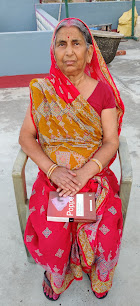Buddhist monks rightly believe that death is to be understood through reason and meditation. Until it is feared, death will always be a source of metaphysical speculations. One can speculate or imagine a world of heaven or hell, or invent the myth of ghost or reincarnation, but the truth is nobody can grasp the unknown through any leap of imagination. Life can be lived likewise death has to be lived. In concious living there is a process of dying. In conscious death, there is a process of living. Dark and light cannot be separated if both are consciously observed, one and other are not different. I can think, speculate, imagine where she is. But I cannot know whether she exists. If she is existing as life or consciousness anywhere, why not she is in me, us, in everything? I am badly missing her. But I know she has got her liberation from the suffering for sure. Miss you Maa. Love you 🙏
A few days ago I lost my mother. I was deeply attached to her. I guess, no child in the world can feel alienated to her mother. She was the most beautiful woman I have ever seen in my life. Her compassionate attitude, caring gesture, gracious smile, suffering, and everything I can remember come to my mind again and again. Perhaps, this is the truth hardly accepted by anyone in a competitive world of success and failure. Every achievement appears to be too small in front of death as a truth. She used to say that "I am not afraid of death but the fact that I won't be able to see all my loved ones is problematic". There is hardly any spiritual leader who neglected the value of non-attachment. But when it comes to samsara, the karmic fate ensures our life-circle to move around attachment towards everything. There is a strong desire to continue with the existing. There is a fear of unknown, uncertain, or death. Death is treated as evil in most of the prominent cultures around the world. However, it is the fundamental basis of life. Only in death life is possible. Only in dying there is a creation. Living eternally is curse only a few could bear. When suffering becomes endurable, it is apt to move on. Unknown is inevitable. No mind with his projection of existing can eliminate the possibility of unknown. Our memory has its own limitations. It can project the known over unknown but it cannot change it.

❤️
ReplyDelete